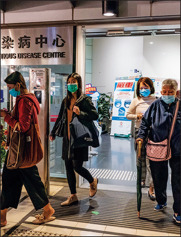2019-nCoV 爆发——早期教训
Offline: 2019-nCoV outbreak—early lessons
By Richard Horton
It is still too early, and available information is still too incomplete, to be certain about many aspects of the 2019 novel coronavirus (2019-nCoV) outbreak in China. However, important elements of the management of this global health emergency—and it is an emergency of major international concern—are becoming clearer. As the outbreak accelerates, there are early lessons to be learned. The transmissibility of 2019-nCoV—or at least its geographical distribution—seems to be higher and broader than initially expected. Why? Partly this may be because of China's rapid expansion of its transport networks, especially air and high-speed rail. Wuhan is a crucial hub: linking west to Chengdu, south to Guangzhou and Shenzhen, east to Nanjing and Shanghai, and north to Beijing. With much of December a period when the outbreak went unreported and unrecognised, the population exposed to the virus is far greater than first thought—a cause for heightened concern.
 Copyright © 2020 Maurizio De Angelis
Copyright © 2020 Maurizio De Angelis
Information is a key tool to manage the outbreak. We have received messages from Chinese journalists struggling to report accurate information from state authorities. From one Caixin journalist: “For some reason, it's very hard to get domestic experts to speak to the media now. But the public needs to hear more advice from experts.” Some observers say that independent infectious disease and public health specialists fear making public statements if those statements have not been approved by Chinese authorities. One can understand the Chinese Government's wish to manage the flow of accurate information to the public. But if that flow is being limited or is simply too little, it would be permissible, indeed surely wise, to empower specialists to speak to the media to give their advice and to allay undue public anxiety.
The health response in China has been impressive, if at times it appears severe—shutting down exit and entry into cities, strict isolation, and bans on certain categories of contact. But to attack the root causes of this outbreak will require reducing risks of animal-to-human transmission. That will mean a concerted effort to close the sources of virus transmission—poorly hygienic animal wet markets. To do so will demand a huge cultural shift in Chinese society, one that should not be underestimated, but one that is essential if this type of outbreak is to be prevented in the future. To safeguard their own citizens, as well as to strengthen global health security, Chinese political leaders must clearly state their commitment to eradicating these markets.
There has been an understandable focus on containing the spread of 2019-nCoV. But less attention has been given to the need for sufficient clinical capacity to deliver care to infected individuals. The viral pneumonia caused by 2019-nCoV can be extremely severe. In the first reports of patients with 2019-nCoV, a third required admission to intensive care, with the majority developing adult respiratory distress syndrome. Even high-income countries with technically advanced health systems would struggle to provide the necessary care to potentially large numbers of patients with severe complications of 2019-nCoV. China has a well developed hospital system, but the surge capacity for intensive care will be limited. What can Chinese authorities do, together with the international medical community, to expand acute medical services, including the supply of skilled hospital staff, to meet the needs of infected patients? This question is urgent.
 Copyright © 2020 AFP/Getty Images
Copyright © 2020 AFP/Getty Images
In 2003, when SARS struck, China's health research system was fragmented and poorly coordinated. Not so today. China's science community has reacted with speed and skill to investigate and report in real time the ongoing outbreak, providing critical public health, clinical, and virological data to guide the national and global response. Research is sometimes seen as a luxury when countries are being urged to invest in basic primary health care. But the 2019-nCoV outbreak has shown the foundational importance of research for any effective public health response. When this latest outbreak has been contained, WHO, with the support of member states, must redouble its efforts to make health research an integral part of universal health coverage. The 2019-nCoV outbreak proves that health research saves lives.
 Copyright © 2020 Anthony Kwan/Getty Images
Copyright © 2020 Anthony Kwan/Getty Images